The Senate Judiciary Committee is where any action relating to intellectual property reform will be played out during the 115th Congress, at least on the Senate side of the Capitol.
Unlike in previous years, we enter 2017 without much support for a fresh round of patent reform, but at least some patent reform measures are sure to be introduced during the 115th Congress. Although the Supreme Court has agreed to hear TC Heartland, which relates to venue in patent litigation, venue reform could be introduced even if it will be on hold pending resolution of TC Heartland. There will, however, likely be attempts to modernize the Copyright Act during the 115th Congress, which is almost certainly why the Obama Administration unceremoniously ousted Register of Copryights Maria Pallante last year. Look for efforts to grant the Copyright Office greater autonomy and independence during the 115th Congress, even a push to remove the Copyright Office out form under the Library of Congress. There are also factions within the industry pushing for reforms to weaken patent rights, and there could well be some attempt to legislatively fix the patent eligibility mess created by the Supreme Court over the past several years. The need for patent eligibility reform has only become more acute given the Patent Trial and Appeal Board declaring an MRI machine to be nothing more than an abstract idea and, therefore, patent ineligible. Stay tuned!
Without further ado, meet the Republicans on the Senate Judiciary Committee. (NOTE: A profile of Democrats will follow).
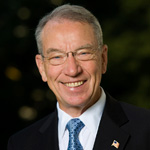 Senator Chuck Grassley (R-IA), Chairman
Senator Chuck Grassley (R-IA), Chairman
Senator Grassley was born on September 17, 1933, in New Hartford, Iowa. He has been married to his wife Barbara since 1954 and has five children. Grassley has been a farmer, a sheet metal shearer, assembly line worker and a politician. Prior to being elected to the Senate in 1980 he served in the House of Representatives for three terms and he also served in the Iowa Legislature. The senior Senator from Iowa, Grassley is famous for his work ethic and connection to his constituents. He currently holds the longest record for not missing a vote, and every year since being elected to the Senate Grassley holds as least one meeting in each of Iowa’s 99 counties. With Republicans taking control of the Senate after the 2014 election Grassley moved from Ranking Member of the Judiciary Committee to Chairman, replacing then outgoing Chair, Senator Patrick Leahy. Grassley remains the Chair of the Judiciary Committee for the 115th Congress. Grassley has previously served as Chairman of the Committee on Finance. He is a strong supporter of the development of wind, solar, biodiesel, biomass and ethanol as a sustainable, domestic, renewable energy source, which is not surprising since he comes from the heart of America’s farmland. Grassley is a pragmatic politician. In April 2014, when large entities were pushing hard for the latest round of patent reform to pass Grassley pumped the breaks, acknowledging that there were significant differences of opinion on the need for additional reform. “Sometimes it takes more time than we’d like, but, the end result is a better product. I’m willing to sacrifice a little time to develop a bipartisan bill that we can all support.” Grassley’s pragmatic approach slowed things down during the 113th Congress, but Grassley (along with other Senators on the Judiciary Committee) introduced the PATENT Act in the 114th Congress. Throughout the 114th Congress Grassley’s staff was aggressively searching for stories about small businesses being abused by patent trolls, which he could use to give patent reform momentum. That never materialized, despite the fact that the PATENT Act was able to pass the Judiciary Committee despite a vocal minority. With respect to copyright reforms, in 2015 Grassley and Leahy called for a study of the Copyright Office and the role of copyright in a digital economy. In December 2016, Senator Grassley expressed an interest in modernizing the Copyright Office and also giving the Copyright Office more independence and decision-making authority relative to its own IT, budget and staffing. Copyright reforms, including Copyright Office reforms, are expected to be revisited during the 115th Congress with Grassley at the helm of the Judiciary Committee.
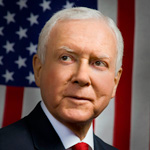 Senator Orrin G. Hatch (R-UT)
Senator Orrin G. Hatch (R-UT)
Senator Hatch, the senior Senator from Utah, was born on march 22, 1934. He has been married to his wife since 1957 and he has six children, twenty-three grandchildren and 14 great-grandchildren. Hatch is currently serving his seventh term in the Senate, being first elected to Senate in 1976. Hatch is a previous Chairman of the Senate Judiciary Committee, and he has a longer tenure than does Grassley, so some may wonder why he is not the Chair of the Judiciary Committee. With the Republican takeover of the Senate in 2014, rather than assume control of the Judiciary Committee, Hatch has taken charge of the Senate Finance Committee, taking over for Senator Ron Wyden (D-OR). Hatch is also a former Chairman of the Senate Health Committee. Hatch has long been a strong supporter of intellectual property rights. He has supported legislation in the past that would expand copyright term and has been a staunch alley of content creators, continually criticizing infringers and supporting legislation that would make it easier for content creators to go after serial copyists. Hatch has also been a driving force with respect to patent policy, for years criticizing the law of inequitable conduct and how infringing defendants charge that every mistake made by prosecuting patent attorneys amounts to fraud. His efforts lead to the creation of supplemental examination, which gives patent owners a mechanism to inoculate patents if a mistake has been made by going back to the Patent Office for a post issue review of potentially material prior art. Hatch has more recently been highly critical of patent trolls and patent litigation abuse. Hatch takes intellectual property matters so seriously that he has a page dedicated to IP matters on his website, which is not typical for Members of Congress. In July 2014, Hatch said that patent trolls must be a top priority for Congress. Hatch was also a co-sponsor of the PATENT Act during the 114th Congress. Hatch, a strong supporter of free trade and the Trans Pacific Partnership trade agreement, loudly objected to the weak protections in the TPP for biologics and pharmaceuticals. While the TPP is now dead in a Trump Administration, Hatch was pressing for renegotiation of those provisions as late as September 2016. With respect to copyrights, Hatch was quite concerned with the sudden resignation of Maria Pallante as Register of Copyrights, saying in a statement that this episode “underscores the longstanding challenges associated with housing the Copyright Office in the Library of Congress.” Hatch will almost certainly be an allay in efforts to give the Copyright Office greater independence and authority as copyright reforms surface during the 115th Congress.
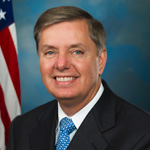 Senator Lindsey Graham (R-SC)
Senator Lindsey Graham (R-SC)
Senator Graham, the senior Senator from South Carolina, was elected to the Senate in 2002 and re-elected in 2008 and 2014. Prior to being elected to the Senate, Graham was elected to the House of Representatives in 1994 to represent South Carolina’s 3rd Congressional District, the first Republican elected to serve that District since 1877. Before being elected to the House, Graham served on active duty with the Air Force from 1982 to 1988. Upon leaving active duty he joined the South Carolina Air National Guard. Graham continues to serve in the Air Force Reserves and is currently a Colonel assigned as a Senior Instructor at the Air Force JAG School. In the Senate, Graham has been primarily focused on issues relating to the military, foreign policy and terrorism. His Committee assignments have included Appropriations, Armed Services, Budget, Homeland Security, Veterans’ Affairs and Judiciary. Senator Graham has not been intimately involved with intellectual property matters. He does not have a track record to speak of with respect to either patent or copyright issues.
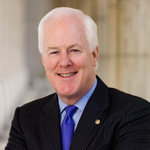 Senator John Cornyn (R-TX)
Senator John Cornyn (R-TX)
Senator Cornyn, the senior Senator from Texas, was born on February 2, 1952. Cornyn was raised in San Antonio and is a graduate of Trinity University and St. Mary’s School of Law, both in San Antonio. Cornyn also earned a Masters of Law from the University of Virginia Law School in 1995. Cornyn has been married for 35 years and has two daughters. Prior to being elected to the Senate in 2002, Cornyn served as a district judge in Texas before being elected to the Texas Supreme Court, where he served for nearly seven years between 1991 and 1997. In 1998, Cornyn was elected as Texas Attorney General, serving in that position for several years until his election to the Senate in 2002. Senator Cornyn served as Chairman of the National Republican Senatorial Committee for the 2010 and 2012 election cycles, and as Minority Whip in the 113th Congress. With the Republicans taking control of the Senate after the 2014 election, Cornyn has risen to Majority Whip, which places him second in leadership only behind Senator Mitch McConnell (R-KY), who is the Senate Majority Leader. Cornyn currently sits on the Senate Finance and Judiciary Committees. Despite his leadership duties, Cornyn has been actively involved in supporting and proposing patent legislation. For example, in May 2013, Cornyn submitted legislation that would make loser-pay provisions applicable to both plaintiff and defendant. In November 2014, Cornyn also promised the Senate would take up patent reform once again in the 114th Congress. Cornyn was a supporter of the PATENT Act during the 114th Congress, which passed the Judiciary Committee, but then stalled. With respect to copyright matters, Cornyn joined forces with Senator Diane Feinstein (D-CA) back in 2003 and again in 2005 to introduce legislation aimed at combating the growing threat that copyright piracy poses to consumers, the entertainment industry, and the U.S. economy.
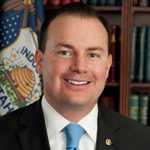 Senator Michael S. Lee (R-UT)
Senator Michael S. Lee (R-UT)
Senator Lee Lee was born on June 4, 1971, in Mesa, Arizona. He is the junior Senator from Utah and a first term Senator who was elected to the Senate in 2010. Lee is a graduate of Brigham Young University with a Bachelor of Science in Political Science, and he is also a graduate of BYU’s Law School in 1997. After leaving law school Lee went on to serve as law clerk to Judge Dee Benson of the U.S. District Court for the District of Utah, and then with future Supreme Court Justice Judge Samuel A. Alito, Jr. on the U.S. Court of Appeals for the Third Circuit. Lee is one of the most prominent leaders of the Tea Party movement. He successfully challenged three term Republican Senator Bob Bennett in the Republican primary, earning the Republican nomination, which in Utah generally assures victory in the general election. Lee’s Committee assignments have included Judiciary, Energy and Natural Resources, and Foreign Relations. A vocal and outspoken critic of the Obama Administration, and sometimes antagonist to Senate Republican leaders, Lee has focused on conservative and libertarian issues while in the Senate. Lee has also focused at least some attention on patent matters. Lee gave a speech about patents and innovation in February 2013 at a Computer & Communications Industry Association (CCIA) event in 2013. In September 2013 he co-authored an article with Senator Leahy in Politico, which focused on the problem of abusive litigation tactics. Lee subsequently co-authored the Senate patent reform bill (with Senator Leahy) that was introduced in 2013. Lee was a co-sponsor of the PATENT Act during the 114th Congress. He is also one of those on the list of potential Supreme Court nominees released by then candidate Donald Trump prior to the election. Senator Lee’s brother, Thomas Lee, an Associate Justice on the Utah Supreme Court, is also on Trump’s list of potential Supreme Court nominees.
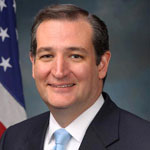 Senator Ted Cruz (R-TX)
Senator Ted Cruz (R-TX)
Senator Ted Cruz, the junior Senator from Texas, was born on December 22, 1970. He was first elected to the Senate in 2012. Cruz graduated from Second Baptist High School in Houston as valedictorian in 1988. Cruz is also a graduate of Princeton University with a BA in Public Policy. After graduating from Princeton, Cruz attended Harvard Law School, graduating in 1995. After leaving Harvard, Crux clerked for Judge J. Michael Luttig of the United States Court of Appeals for the Fourth Circuit, and then later for Supreme Court Chief Justice William Rehnquist. After working for President George W. Bush’s presidential campaign in 1999, Cruz later served in the Bush Administration as an associate deputy attorney general and as a director of policy planning at the Federal Trade Commission. Subsequently, Cruz was appointed Solicitor General of Texas, a position he held from 2003 to 2008. Cruz has authored 70 U.S. Supreme Court briefs and argued before the U.S. Supreme Court on nine separate occasions. Since entering the Senate in 2012, Cruz has become the politician most closely associated with the Tea Party movement. His Committee assignments have included Armed Services, Judiciary, and Commerce, Science and Transportation. In the 114th Congress Senator Cruz chaired the Senate subcommittee on Space, Science and Competitiveness, which has oversight jurisdiction of NASA. Prior to the 114th Congress, Senator Cruz did not have much of a track record on intellectual property matters in the Senate. Cruz did, however, successful argue one patent case in front of the United States Supreme Court. See Global-Tech Appliances v. SEB. Cruz, during the markup of the PATENT Act in the Senate Judiciary Committee, explained that he thought the PATENT Act leaned too far against small patent holders and would harm the economy. Cruz ultimately voted against the PATENT Act in committee.
 Senator Ben Sasse (R-NE)
Senator Ben Sasse (R-NE)
Ben Sasse was elected to the Senate in 2014, winning each of Nebraska’s 93 counties, and securing the second-largest margin for a new senator in the history of the state. Sasse, a constitutional conservative, campaigned on restoring the Constitution to its rightful place and encouraging a more constructive politics. A fifth-generation Nebraskan, Sasse is a graduate of Fremont High School, and attended Harvard University and then earned a PhD in American history at Yale. Prior to being elected to the Senate, Sasse spent the previous five years as President of Midland University. Sasse has also previously worked with the Boston Consulting Group and McKinsey and Company, as well as private equity firms and not-for-profit organizations. Sasse came to some national prominence during the 2016 election cycle as being one of the most outspoken Republican Senators in the Never Trump movement. Senator Sasse is a new addition to the Judiciary Committee for the 115th Congress and does not appear to have any particular expertise with intellectual property matters generally, or patent or copyright matters specifically.
 Senator Jeff Flake (R-AZ)
Senator Jeff Flake (R-AZ)
Senator Jeff Flake, born on December 31, 1962, was born and raised in Snowflake, Arizona. Flake grew up working alongside migrant workers on a cattle ranch. Flake graduated from Brigham Young University, where he received a B.A. in International Relations and an M.A. in Political Science. In 1987, Flake started his career at a Washington, D.C. public affairs firm, but ultimately decided to return to Africa, where he had been sent on a Mormon mission. In Africa, Flake served as Executive Director of the Foundation for Democracy in Namibia. In 1992, Flake and his family moved back to Arizona where he was named Executive Director of the Goldwater Institute. Flake, the junior Senator from Arizona, was elected to the Senate in 2012, succeeding Senator Jon Kyl. Prior to being elected to the Senate, Flake served in the House of Representatives for twelve years. Flake sits on the Judiciary Committee, the Energy and Natural Resources Committee, and Foreign Relations Committee where he also serves as ranking member of Subcommittee on African Affairs. While in the Senate, Senator Flake has not been intimately involved with intellectual property matters. In 2016, Flake introduced patent venue reform legislation to, in his words, stop patent trolls. “It’s clear that these types of forum abuses impose substantial costs on the economy and cannot be ignored,” said Flake. “I urge my colleagues to support the reforms contained in the VENUE Act to bring about a renewed attention to patent venue reform and to address the unfair forum shopping that plagues patent litigation.”
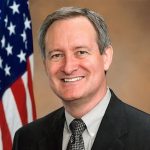 Senator Mike Crapo (R-ID)
Senator Mike Crapo (R-ID)
Born in 1951, Senator Mike Crapo is a 4th generation Idahoan. He graduated from Idaho Falls High School in 1969, from Brigham Young University in 1973, and Harvard Law School in 1977. Crapo served eight years in the Idaho State Senate from 1984 to 1992, and was elected to the U.S. House of Representatives to represent Idaho’s 2d District in 1993. He served in the House for six years before he was elected to the U.S. Senate in 1998. He was reelected in 2004, 2010, and 2016. Crapo has served on the Banking Committee, the Finance Committee, the Environment Committee, the Budget Committee, the Indian Affairs Committee, and the Agriculture Committee. He is a member of numbers caucus groups relating to the environment and military. For purposes of technology and innovation, he is a member of the Senate Biotechnology Caucus and the Medical Technology Caucus. Crapo is a new addition to the Judiciary Committee and does not appear to have any particular expertise with intellectual property matters generally, or patent or copyright matters specifically.
 Senator Thom Tillis (R-NC)
Senator Thom Tillis (R-NC)
Senator Thom Tillis was born on August 30, 1960, born into working-class family with his father, mother and five siblings. His family lived a modest working class life, frequently relocating depending on where his parents could find work. After graduating from high school, Tillis was unable to afford college, so he took a job as warehouse records clerk earning minimum wage. Ultimately earning a college degree at the age of 36, Tillis became a top-level executive at PricewaterhouseCoopers and IBM. After a 22 year private sector career Tillis was elected to the North Carolina House of Representatives in 2006 and was selected by his peers to serve as Speaker of the House from 2011 to 2014. As Speaker, Tillis played an instrumental role in reforming North Carolina’s tax and regulatory codes. Tillis was elected to the Senate in 2014, narrowly defeating Democrat incumbent Kay Hagan, winning by approximately 50,000 votes (or 1.7% margin). During the 114th Congress Tillis served as a member of the Senate Armed Services Committee; Veterans’ Affairs Committee; Agriculture, Nutrition and Forestry Committee; Judiciary Committee, and the Senate Special Committee on Aging. With respect to patents, during the markup of the PATENT Act Senator Tillis submitted two amendments. The first would extend the sunset date on Covered Business Method (CBM) review. Currently, as a result of the AIA, CBM will sunset 8 years after it became effective, which would be September 16, 2020. Under the Tillis Amendment CBM would not sunset for an additional 8 years, or until September 16, 2028. The biotechnology and pharmaceutical industries were undoubtedly extremely pleased with his second proposed Amendment, which would make it impossible for an IPR to be filed against pharmaceutical patents or patents that cover biological products that have been approved by the FDA.
 Senator John Kennedy (R-LA)
Senator John Kennedy (R-LA)
Senator John Kennedy was elected to the United States Senate in a run-off election held on December 10, 2016. Kennedy defeated Democrat Foster Campbell by more than 21 percent. Prior to running for Senate, Kennedy was elected to his fifth term as State Treasurer of Louisiana in 2015. Prior to his position as Treasurer, Kennedy served as Secretary of the Department of Revenue, Special Counsel to Governor Roemer and Secretary of Governor Roemer’s Cabinet. He was also an attorney and partner in the Baton Rouge and New Orleans law firm of Chaffe McCall. Kennedy graduated magna cum laude with a degree in political science, philosophy and economics from Vanderbilt. He later received a law degree from the University of Virginia and his B.C.L. degree from Oxford University in England. Kennedy has been an adjunct professor at LSU Law School and is a volunteer substitute teacher for East Baton Rouge Parish public schools.

![[IPWatchdog Logo]](https://ipwatchdog.com/wp-content/themes/IPWatchdog%20-%202023/assets/images/temp/logo-small@2x.png)

![[Advertisement]](https://ipwatchdog.com/wp-content/uploads/2024/04/Patent-Litigation-Masters-2024-sidebar-early-bird-ends-Apr-21-last-chance-700x500-1.jpg)

![[Advertisement]](https://ipwatchdog.com/wp-content/uploads/2021/12/WEBINAR-336-x-280-px.png)
![[Advertisement]](https://ipwatchdog.com/wp-content/uploads/2021/12/2021-Patent-Practice-on-Demand-recorded-Feb-2021-336-x-280.jpg)
![[Advertisement]](https://ipwatchdog.com/wp-content/uploads/2021/12/Ad-4-The-Invent-Patent-System™.png)







Join the Discussion
No comments yet.